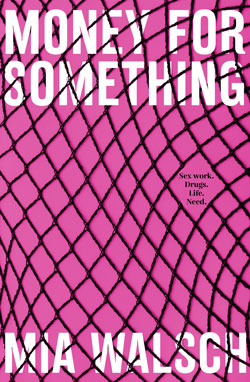Book review: Money for Something
In the first article in a new series of literary criticism presented in partnership with Writers SA, A Year in Review, Adelaide writer Katerina Bryant reviews Mia Walsch’s memoir, Money for Something.

A Year in Review is an initiative by Writers SA, with assistance from the Australia Council of the Arts, to produce a series of book reviews published in InDaily over the next 12 months.
The reviews will focus on titles published during the pandemic, highlighting the work of Australian authors and publishers during this difficult time for the sector, and giving literary critics an outlet for their work that supports a strong culture of reading.
__________
“I want everything to be too much, too exciting, too too.”
Money for Something is expansive. The book is a meditation on drug use and mental illness; an account of sex work that is generous and intimate and funny; and an ode to the women Mia Walsch met along the way. Yet with Walsch’s good humour and generosity, it never feels too much. It sits comfortably in its vastness.
That is not to say Money for Something is an easy memoir to read. Walsch plainly depicts drug abuse, and the effects on her body. On drugs, she says: “I have no shame, only need.”

Money for Something is published by Echo.
Walsch describes thoughts of self-loathing, self-harm and a suicide attempt. “The hate I feel for myself stings and sears. It razes through me like fire across a field left to crackle in the sun.” One scene chillingly shows a client turning violent. It can be confronting, but it is honest and Walsch is generous in how she shows these parts of her experience.
She is clear throughout the memoir that she does not wish to “fulfil the standard narrative of sex work being something negative”. For her, she says, it was a positive experience, “aside from the fact that I let it enable my drug addiction”. Sex work, she says, receives immense stigma from both the “wider world” and friends and family.
Walsch also uses her experiences and those of friends to illustrate why sex work needs to be decriminalised to protect workers. She writes, “The stigma surrounding sex work means that some people still think that doing sex work is an invitation to violence”, sharing that she, too, internalised this after her own experience of violence. In these moments, her account is forceful in its own right while also agitating for broader structural change.
The compelling centre of the book is the intimacy Walsch feels with fellow sex workers. Her joy at finding her community is beautiful to read. Describing an evening where they have a Christmas party at a luxe restaurant, she writes: “The night is so special to me… looking up and down the table at all these exquisite women, every one a complex trove of personality… And for once I’m fulfilled.”
Later in the book, after leaving sex work to focus on studying writing at university, Walsch writes of her ache to return to the friendships she fostered. She describes the way the receptionist at The Manor wrote little songs about her, singing them when she was low. “I miss the click-click-click of heels across tile.”
Throughout Money for Something, Walsch works to unpack the stigma and myths present around sex work. She is clear in saying this is her story, her choice of work, and that while the book conveys drug use and mental illness, this is not the experience of all sex workers. She writes that, “I’ve heard it said that every sex worker is damaged in some way, and I’d say that is true – because every single person is damaged in some way”.
Money for Something is a careful account that speaks to the broad range of people who are or have been sex workers (“If you think you don’t know anyone who has done this kind of work, think again”). In this illuminating memoir, Walsch does not speak for everyone, only herself. And as readers, we are lucky for it.
__________
Katerina Bryant is a writer based on Kaurna land (Adelaide). Her first book, Hysteria: A Memoir of Illness, Strength and Women’s Stories Throughout History, is out now.




